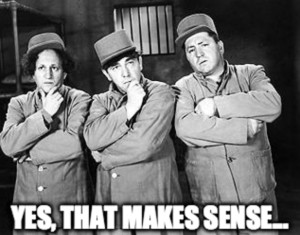The big regret with the Sirohi case is that I never attended the hearing to hear the testimony first-hand. At the time, contrary to widespread belief, I was not really interested in anything that did not involve me, and the Sirohi investigation had been completed before I even joined OIOS. As far as I knew, it had nothing to do with me.
The decision not to attend turned out to be unfortunate, I will even concede it was an “error of judgement” on my part!
The reason for that is because – by all accounts – the evidence led in the hearing was every bit as shocking, and even more scandalous, than the Nguyen-Kropp & Postica case – and of course, once again it involved the same cast of characters, and once again the Organization was anxious to cover it all up.
It turned out that I did have a personal interest in all of this, because one of the complainants in the case was Elizabeth Hampton-Manley. That was a co-incidence, because she had featured earlier in my saga. She was on the Rebuttal Panel that had wriggled out of actually considering the Rebuttal of my Annual Appraisal.
Hold on to that thought.
There was also another connection. Eddie Yee Woo Guo, Director of the Inspection & Evaluation Division had been involved in mismanaging the complaint against Mr. Sirohi, being totally unable to follow the procedures in ST/SGB/2008/5 when one of his own staff complained of sexual harassment, but had also been on the panel that investigated me for ‘harassment’ over the grafitti-gate fiasco. That, oddly enough, was also covered by ST/SGB/2008/5.
Hold on to that thought too.
– – – – –
OIOS did not exactly cover itself in glory in the Sirohi hearing.
Comedic throughout, it was punctuated with frequent moments of total farce. I am sorry I missed it. The whole fiasco was compared to a soup sandwich and nobody who was there came back to describe it to me using such words like efficiency, competence or integrity.
Mr. Sirohi had worked – of all places – in OIOS, but in the Inspection & Evaluation Division, where it seems his continued presence was an obstruction to somebody else’s wish to be promoted. The suggestion, therefore, is that a sexual harassment complaint was conjured up as an excuse to get rid of him, thus creating a vacancy at the P4 level that one of his detractors was only too willing to fill.
This whole sorry charade had been performed when Michael Dudley was in sole charge of OIOS/ID (and lobbying hard for the D2 director’s post).
The investigation was over, the report had been sent to OHRM and Mr. Sirohi had been fired long before Michael Stefanovic ever joined OIOS, so he knew nothing about it, and it was clear that many people were very anxious for things to remain that way. Suzette Schultz of the OIOS “Professional Practices Section” (yes, that would be the same Suzette Schultz as was one of the star witnesses in the Nguyen-Kropp & Postica hearing) was aware of it but whether by accident of by design, she conveniently failed to let her Director know there was even going to be a hearing.
Some even say there was a deliberate plan to keep Stefanovic in the dark about this. Only days before the hearing however, Florin Postica – the bogey man – told him about it, so, Stefanovic like the best laid plans of mice and men often do, that plan went horribly wrong when he found out about the hearing.
Of course we are expected to believe that there was nothing sinister in the OIOS/ID Director not being aware that his staff were required to testify before the Tribunal. If you believe in hobgoblins, elves and fairies; this should sound quite plausible to you.
The initial ‘Sexual Harassment’ Complaint
It would be entirely fair to ridicule ALS by suggesting their horse fell at the first fence. They never had any sort of horse capable of running any sort of race; they had a donkey – and a noticeably lame one at that, so one cannot help but to ridicule whoever made the decision to run the thing in the first place …..
It appears that this sorry saga began when one of the women in IED went to see her Section Chief and the Acting Head of the Division and complained of sexual harassment. There should be nothing wrong with that. She was certainly entitled to do that, and indeed if she was subject to sexual harassment, it is only right and proper that she must do that.
Unfortunately, neither of the two senior staff of the Inspection and Evaluation Division knew what to do, so the first thing that they did was make a complete mess of it. It appears they carried out some sort of “assessment” and circulated a questionnaire among their staff asking them if they had experienced any type of harassment.
Seriously?
One can only stand back in awe and amazement. When senior staff in say, the Department of Economic and Social Affairs don’t know how to deal with a harassment complaint, one might make allowances for them – but it speaks volumes for the competence of the Inspection and Evaluation Division whose mandate – according to the OIOS website – is “to conduct evidence-based evaluations of the UN Secretariat’s programmes, with three main aims:
• To help programmes deliver better results
• To enable the UN as a whole to learn from their experiences, and
• To provide public accountability.”
That may be a joke (but never mind) but some of us have just a tiny bit of trouble working out how they go about evaluating anything at all if their management staff can neither find nor read basic procedures, which in the case of a complaint of sexual harassment would be ST/SGB/2008/5.
That said, of course, why would they bother? The answer was nearby. It would be a lot quicker and easier for the Acting Head of the Inspection & Evaluation Division (Eddie Yee) to walk along the corridor and ask the Acting Head of the Investigation Division (Michael Dudley) what do to when a misconduct complaint drops on your desk.
The Investigation Division were, after all, the “experts” when it came to the investigation of misconduct, and most people in Eddie Yee’s shoes would probably opt for the easiest solution to the problem. Go and ask the guy whose job it is to know….
So did he do that? We don’t know. Maybe he did, maybe he didn’t, but sending out a questionnaire soliciting complaints is …. well…. let’s just say it’s nobody’s ‘best practice’ and move swiftly on.
In any event, it seems that Eddie Yee then refered the complainants to Michael Dudley, (again proving that he could not follow the procedures explained in ST/SGB/2008/5 but never mind that either.)
Who cares about procedures anyway?
If IED began by mishandling the complaint, ID then compounded the felony because it appears that as far as OIOS was concerned, the complainant in this case of sexual harassment was NOT one of the aggrieved parties. Instead it was none other than Michael Dudley.
Why?
A very good question.
The Tribunal heard that Dudley had spent an hour talking to multiple complaints before the case was initiated, but failed to make any sort of note about it. He even told one complainant that he has a daughter and therefore understand what the complainant went through.
Why, if the aggrieved parties were making their complaints to the then Acting Director of the Investigations Division, these same aggrieved parties were not formally recognised as “the complainants” is just one of life’s little mysteries. Its maybe best not to worry about it…..
Eddie Yee knew and worked with Michael Dudley, but the UN did not consider that created any conflict of interest to his investigating me over the ‘Graffiti-gate‘ whiteboard incident, and the strange manner in which Mr. Sirohi was investigated and dismissed simply does not pass the sniff test.
Yee did nothing to try to defend Mr. Sirohi, so it might be fair to conclude that they were not good friends. This is the point at which anyone who has a bad habit of asking questions just to satisfy his curiosity might start wondering whether Eddie Yee wanted rid of Mr. Sirohi. Was Sirohi a threat to Yee’s chances of promotion or did Yee just want someone else to have his job? Who knows?
in any event, the complainants – and it appears that there were not more than one – went to see Michael Dudley about their sexual harassment complaints.
Did it occur to Dudley that sexual harassment was governed by ST/SGB/2008/5? Sorry, we don’t know.
What did they tell him? No idea. Did they see him separately or as a group? Don’t know. What did he tell them? Sorry, no, we don’t know that either, not because it is confidential but because he never bothered to make a note of anything. He did, however express sympathy for them, stating the had a daughter. How that is relevant we are not entirely sure, but never mind. If anyone thinks this was indicative of his having pre-judged Mr. Sirohi to be guilty; dismiss the notion from your mind immediately!
Did the complainants then put their complaints in writing? No, apparently they didn’t.
How the investigation panel knew exactly what the allegations were remains something of a mystery, but never mind that, because Dudley had presumably decided that there was enough probable cause to initiate an investigation.
In fairness, under ST/SGB/2008/5, para 5.14, the decisions as to whether or not (1) the complaint was made in good faith, (2) there are sufficient grounds to warrant a formal fact-finding investigation, and if so (3) to form a fact finding panel rests with the ‘responsible official’ i.e. the USG/Oversight and not with Dudley.
Fine – but here is the problem; if the original complaints from the aggrieved parties was not in writing, and Michael Dudley did not write up any notes of the meeting: how exactly was the USG/Oversight supposed to review the complaint to assess it, and then decide what to do about it?
Don’t worry about that either.
Of course it could just have been “a mistake” that Dudley had not made any note of his meetings with the complainants. Perhaps he would claim that he did make a file note recording what had happened at the initial meeting and that he had given it to somebody else who failed to put it in the case file.
That is not impossible. It would not explain why that other person had not put it in the case file and it would not explain how three (allegedly) “professional” investigators had not even realised there might be some documentation missing when they started planning their investigation…. but never mind.
The curious follow-on to Dudley’s unexplained role as the complainant of record in the investigation however, is why Susan Maddox (appearing as Counsel for the Organization again) should tell one of the OIOS’ witnesses that when testifying they should avoid mentioning Michael Dudley’s name at all, and especially, as the complainant.
Excuse me???
In the real world that is the sort of thing that might raise a judge’s blood pressure, and in a very bad way. It is the sort of thing that is likely to infuriate a judge to such an extent that he vents his anger in a nasty letter to the Bar Association. In the real world, it is not the sort of thing that is taken lightly, and can abruptly turn a litigator into a former litigator.
In what passes for a “justice” system in the UN, on the other hand….. well, …. er… let’s not bother about it.
 Then it was downhill from there.
Then it was downhill from there.
When the investigation began, some – but not ALL – of the documents from the attempts to solicit information implicating Mr. Sirohi in sexual harassment were provided to support the allegation.
Some BUT NOT ALL, and nobody asked for those that were missing….
Hold on a minute. The first requirement of any complaint should be that it be made in good faith. This is a statutory requirement under ST/GGB/2008/5 (para 5.14) and reporting misconduct in bad faith would be misconduct in itself.
At this point, any investigator with the requisite number of brain cells required to generate an original thought should have realised that IED had actually solicited complaints against Mr. Sirohi, and they had then compounded the felony by being selective in providing those e-mails. That not only cast doubt on whether the complaint was made in good faith, it should have had a bearing on the credibility of the witnesses.
Of course, such revolutionary ideas are not welcome in OIOS. Investigators in OIOS are supposed to do what they are told, produce the result they are expected to produce and certainly not go asking too many questions……
Andreea Boer was asked why she hadn’t asked for everything relevant to the complaint so she could make a proper assessment of the allegations before embarked on her investigation, but it seems she could not come up with an answer.
The judge, apparently, said that an investigator should have an inquisitive mind. It is perhaps fortunate I was not in the courtroom. After my exasperating experience trying to get answers to such questions as the one about asking questions just to satisfy my curiosity, it is very possible I could have laughed out loud.
It does not appear to have been an investigation as much as the blueprint for a lynching. When interviewed, Mr. Sirohi had been asked if there was anyone he thought that OIOS should interview and he provided some names – but OIOS was not interested in any defence he had to offer.
Not for the first time, OIOS had concentrated on collecting information to find the subject guilty without ever even bothering to try to determine if the information provided by witnesses was credible. Independent corroboration is another of many concepts OIOS is happy to ignore in their unique approach to “fact finding.”
Was this complaint being pursued both formally and informally?
The first curious observation is that the the Ombusdman’s Office was trying to offer “mediation” in this case at the same time as the OIOS investigation was underway. That’s interesting because it raises a at least two very interesting questions; who asked for mediation? And when?
Was it the (allegedly) aggrieved parties?
In para 5.6, ST/SGB/2008/5 states that aggrieved individuals may ask for assistance from a third party in seeking informal resolution, and the Ombudsman’s Office is one of the suggested options.
Fine. There is no problem with that. My own experience of the Ombudsman’s Office of course was not a positive one but if the aggrieved parties had approached the Ombudsman’s Office for informal resolution, why did they also make a complaint and go down the formal route?
Was Michael Dudley aware of any approach to the Ombudsman’s Office for informal resolution? If so, he should have realised that the aggrieved parties were proceeding under ST/SGB/2008/5 para 5.5. If so, why was he interfering in the matter by making a formal complaint against the wishes of the aggrieved parties? And, why did he not let the mediation run its course? Did he, in fact, persuade them that mediation was unnecessary and instead press for formal investigation? Of course it would help if that could be answered from the detailed file note he wrote up after his meeting with the aggrieved parties, but of course it would maybe have helped if he had actually written one.
Anyone who thinks that the Lord moves in mysterious ways should understand that the Lord is a rank amateur at the sport compared to the conspiratorial machinations of the UN Secretariat.
Investigations by a Panel as opposed to investigation by an individual
Sexual harassment complaints in the UN are investigated under ST/SGB/2008/5 which clearly spells out the procedure; and that is that a panel (normally a lay panel) be formed to investigate the complaint. The “professional investigators” of OIOS however, do not appear to have been able to follow that basic procedure properly.
The whole concept of a panel appears to have gone out of the window. Instead, it seems the Sirohi case was mostly investigated by Andreea Boer alone, who should never even have been on the panel in the first place if – as was alleged – she was a personal friend of Elizabeth Hampton-Manley, one of the complainants.
Once again, the UN seems to have considerable intellectual difficulty with the fundamentally simple concept of a conflict of interests.
What are OIOS investigations actually supposed to achieve?
There is a reason why (at least in jurisdictions where corruption is actively discouraged) an investigator who is a personal friend of the (allegedly) aggrieved party would never be allowed to investigate that case.
This is not, of course, a policy familiar to the UN.
In an attempt to establish facts, some investigators (and I include myself in this category) believe that it is actually important to assess the credibility of any witness providing information. This is particularly important in sexual harassment or sexual assault cases. In the UN these have to be investigated in the absence of any scientific evidence and therefore usually boil down to a “he says/she says” scenario.
The interviewing skills of the investigator are therefore extremely important. In the absence of other evidence, it is of considerable importance that investigators satisfy themselves as to the credibility of the witnesses and eliminate any reasonable suspicion that either one of the parties might be lying.
OIOS/ID however disagrees. The PIP that they tried to stuff down my throat insisted that questions asked in interviews should only be asked in order to prove an element of one of the rules believed to have been contravened and nothing else, and that the purpose of a subject interview was to give the subject the opportunity to comment on the evidence collected, and nothing else.
According to this logic, there would be nothing wrong with an OIOS investigator working on a case where they were a personal friend of the victim, because OIOS thinks the purpose of the interview is only to find out whether or not a rule was violated. OIOS investigations have nothing to do with finding out what actually happened, and they do not include any sort of assessment of the reliability of the source or the accuracy of the information, and the result is often…… well, the travesty that was visited on Mr. Sirohi brings the ‘private Gestapo’ concept into sharper focus.
Sadly, we cannot say that Sirohi was alone or that this case was an isolated incident. Even leaving me out of it, von der Schulenburg and Kompass and the investigation of Baldini’s complaint against Stefanovic leap to mind, to say nothing of the undisguised hatchet job that PPS did on the Ms. Nguyen-Kropp and Mr. Postica. There are times when one wonders whether the UN investigators uniform shouldn’t be a white robe with a full-face pointy hat.
Is it any wonder that OIOS found it impossible to answer the questions that I raised about the PIP?
Motives?
Somewhere lost in the past of most investigations is a motive, and there must have been one in the Sirohi case. It remains possible that the complainants did indeed suffer what they believed to be sexual harassment; but the evidence brought out in the hearing disputes that their complaint was supported by such information as would support a reasonable belief that any sexual harassment had, in fact, occurred.
If Susan Maddox disagreed it was up to her to rebut that evidence – but she never did so.
Was there an ulterior motive for their complaint?
Was the whole thing just an excuse just to get rid of Mr. Sirohi? If it was, there could be parallels to the way in which OIOS was obviously desperate to be rid of me. In my case, I had complained from the beginning that the PIP was nothing but a contrivance intended to prevent me renewing my contract of employment.
OIOS could not deny that because they could not answer any of my questions to show how the PIP was justified, but the very same people as were responsible for retaliation against Ms. Nguyen-Kropp and Mr. Postica had given me an Annual Appraisal which was the most apparent case of retaliation since Jimmy Doolittle bomber Tokyo, even if the UN refused to recognise it as such.
My attempt to rebut that Appraisal was stymied by a Panel that included someone who had essentially benefited from an investigation that should never have been commenced because it was the complaint was not based on a reasonable belief that misconduct had actually occurred, but was conducted primarily by a personal friend, produced a report that made findings not actually supported by the evidence, but resulted in the subject being (unfairly) fired.
Any questions so far? No? Good.
So, taking half a pace backwards to consider the universe in its totality and ask questions of the WTF variety, at times like this it is difficult not to wonder whether Hampton-Manley’s presence on a Rebuttal Panel that failed to exercise its mandate and actually consider the grounds for my rebuttal had been an opportunity to either:
- repay a favor to Michael Dudley …… if, in fact, such a favor was owed;
- help create a P4 vacancy in OIOS/ID that either her friend Boer, or another of Micheal Dudley’s acolytes could get, or
- both.
Had my rebuttal panel been the quid pro quo for the Sirohi stitch-up, or was it just another random coincidence? In the incestuous world of the UN, who really knows why anything happens? Rules and Regulations are printed in black and white but seem to be interpreted through a hallucinogenic fog in a hall of mirrors.
The UNDT hearing and the public humiliation of OIOS
The Organization does not like UNDT cases going to a hearing; too much information gets out and in cases like this one, it is easy to understand why! The Secretary-General wants the Member States to think the Organization is efficient and effective, anything that exposes it as a shambles just has to be covered up.
It is no wonder that there was such an effort to keep Michael Stefanovic in the dark about the Sirohi hearing; if he knew about it, it would strengthen his arguments that something had to be done, and those people who wanted it kept quiet had good reason to be concerned.
The most appropriate word to describe the whole affair being rude and unprintable, let us be content with describing it as a “pig’s breakfast”.
There were so many nominations for “Best OIOS Witness in the Hearing” that is was difficult to know who deserved the prize.
The senior investigator on the OIOS panel was Youssou N’Ndiaye. Even forgetting the fact that he was the most senior investigator on the case, he was part of the panel; he should have been involved with absolutely everything that was done on the case. Unfortunately, it was clear from his sterling performance in the witness box that he hadn’t seen the ball since kickoff. 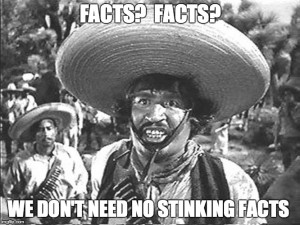
He appeared to be blissfully ignorant of what was going on and only took part in one interview, and that was of Mr. Sirohi himself. He appeared so clueless that the Judge even asked him if he could point out Mr. Sirohi in the courtroom. Unfortunately, he couldn’t.
In the course of giving evidence about how she investigated a case in which her friend was one of the aggrieved parties, Andreea Boer declined to answer a question in open court. Instead, she asked if she could give her answer and speak to the Judge privately in his Chambers.
In most courts in most jurisdictions in the world, the very suggestion of such a thing would have lawyers frothing at the mouth.
In the UN, well…. let’s not make a fuss but just move swiftly on.
At one point the Judge asked a witness when she had last spoken with Andreea Boer, and was mildly surprised to learn that this had been just a few days earlier, before the hearing started. It appears that Boer had – apparently at Susan Maddox’s request – contacted the witness to remind them that they should just stick to what they had said during the investigation.
Pardon?
Maddox claimed that she had asked Boer to contact the witness because OIOS had that witness’ contact details and she did not.
How this makes any sense is just a little of those little mysteries that one learns not to bother wondering about; especially if all the witnesses were UN staff members, whose names and telephone numbers are all in the directory that is available to everyone, including Susan Maddox and her staff in ALS who are
Jolanta Thomassen, another Dudley acolyte (and conquering heroine of the Schulenburg “investigation”) admitted that having discussed details of other OIOS investigations when having a drink at the bar at a conference in Switzerland, telling everyone present the details of what she was working on.
When asked if that would be a breach of confidentiality, she had to hesitate to think of an answer, but then explained that it wasn’t, because she had not told anyone the specific case numbers.
It also transpired that one of the OIOS investigators had contacted one of the witnesses to “remind” them what they had to say when testifying.
When disclosures of that sort come out in evidence in the real world, there tend to be consequences, usually of the ‘very severe’ variety.
In the UN, it seems to get lost in the fog, but it certainly does not reflect very favourably on OIOS. 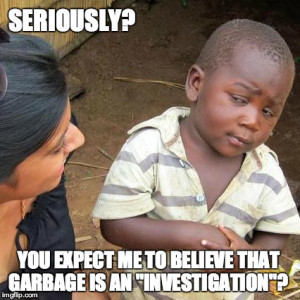
In fact, the case does not appear to have gone very well for the Organization at all.
What upset the ALS apple cart most, of course, was OIOS/ID Michael Stefanovic appearing as a witness.
Oh dear….
Having reviewed the investigation file, he testified and expressed his professional opinion that the investigation was flawed from the outset, that the evidence gathered did not support the findings and that Mr. Sirohi should never have been fired. The whole thing was riddled with more holes than a Swiss cheese in a string bag. He also said that if he had been the in charge of OIOS/ID when the report was issued, he would never have signed off on it. Interestingly, Dudley did sign off on it, seeing no problems with it, and never considering that there might just be something irregular about “the complainant” also approving the investigation report, but don’t worry about that. The UN does not actually believe in any of that “checks and balances” nonsense anyway.
The hearing exposed just how inept OIOS really was. The word “Oops” doesn’t even begin to decribe it…..
What was going on here? That was the $64,000 question, and like many questions in the UN; a healthy degree of cynicism or an unhealthy interest in conspiracy theories will often lead to the same conclusion. Could it be that somebody wanted Mr. Sirohi out of the way so that someone else – someone whose face fit – could get the job instead? Perish the thought.
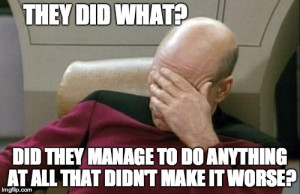 But even if that never happened, or if it was purely co-incidental and everything was above board, the hearing raised some extremely interesting questions that were never answered. Not least of these were:
But even if that never happened, or if it was purely co-incidental and everything was above board, the hearing raised some extremely interesting questions that were never answered. Not least of these were:
1) why was Michael Dudley involved in the matter at the beginning?
2) why had he failed to direct the investigation properly? and
3) why was a clearly inadequate investigation report sent to OHRM?
At the end of the fifth day of the hearing, the judge (who was presumably had no great inhibition against asking questions just to satisfy his curiosity) caused a great shock to the established world order when he announced that he wanted to hear from the one witness that Susan Maddox was most anxious was never called as a witness: Michael Dudley.
Oh dear.
I had sat through the Nguyen-Kropp & Postica hearing, and had watched Susan Maddox bumble through the Respondent’s case with all the legal precision of a drunk man on roller-skates in the dark, but there was one point on which she was incisive, decisive and determined; that Michael Dudley should not be called at a witness. In that case, she got away with it. On this occasion, her luck ran out.
So, after having fought tooth and nail for to insist that Sirohi was guilty and fire him, the Organization magically and suddenly settled the case after all the other witnesses had been heard, but before Michael Dudley had to testify.
We are expected to believe that that was just a coincidence. We are also expected to believe that there is nothing sinister in the fact that no order or judgement recording the facts of this case have ever been published. We are expected to also believe it is a coincidence that the Schulenburg case was ended, settled and buried in the same way, and further, that nobody is allowed to know how much these settlements cost the Organization.
The OIOS “investigation” into Mr. Sirohi had been another comprehensive, colossal screw-up from start to finish, but the sinister thing that should not be forgotten is that this was used as the excuse to fire an OIOS staff member who should never even have been investigated in the first place.
Of course the decision to terminate Mr. Sirohi was not taken by OIOS – it was taken by Catherine Pollard, the ASG/OHRM, friend and protector of Michael Dudley. (Yes, that would be the same Catherine Pollard as Carman Lapointe went running to for advice, asking if Peter Gallo could be suspended immediately for the ‘Graffiti-gate‘ whiteboard incident…..and yes, the same Catherine Pollard who was the subject of a complaint by OIOS/ID Director Michael Stefanovic which the Organization refused to investigate.)
The UN is a hotbed of petty intrigue and conspiracy, and an incestuous one at that.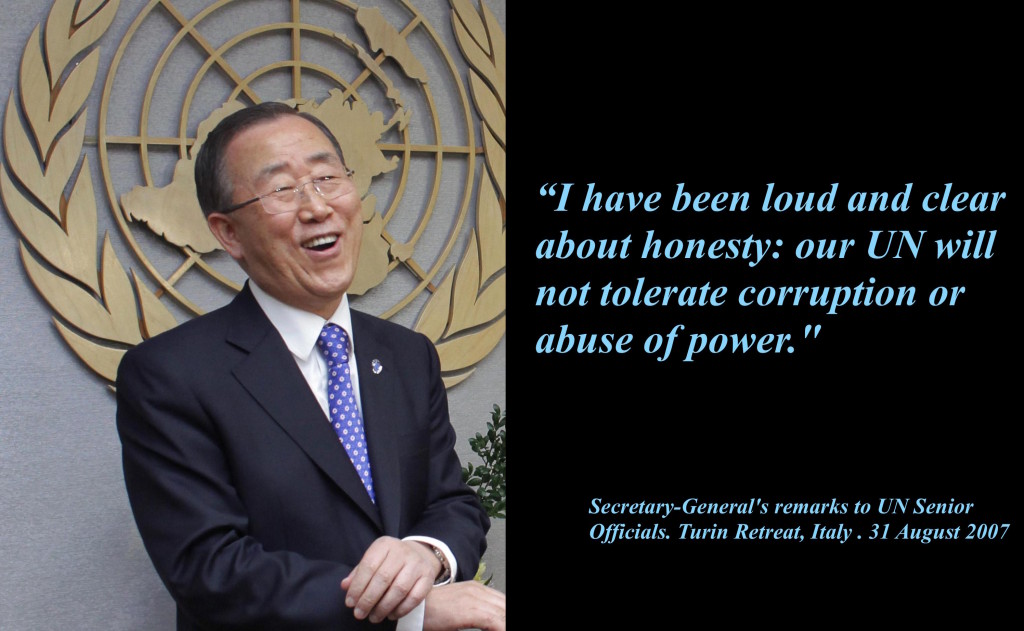
The Importance of competent investigations in SEA cases
The Sirohi case demonstrates how it is critically important that sexual harassment and sexual assault complaints be investigated competently and professionally. In many such cases the facts are reduced to a “he says/she says” situation so the credibility of the complainant and the subject become paramount, and the success of the investigation can depend heavily on the skill of the investigator.
The nature of these allegations are serious. If established, it should be grounds for dismissal and if any element of assault is involved, it is appropriate that the matter be pursued criminally. If, on the other hand the allegations are unfounded, malicious or made in bad faith, the subject has to be exonerated and anyone knowingly making a false accusation or misleading information in such a case must face similarly face the consequences of their actions.
Sexual misconduct accusations carry very serious implications. There is very little wiggle room here. Incompetence in the investigation process is unacceptable and any bias on the part of investigators must be intolerable.
Who was responsible for managing the Sirohi investigation? Where was the investigators supervisor when all of this chaos was reigning?
A good question.
Nobody seemed to know, but that was Vlad Dzuro.
Oh well, you may think, given his insistence that I must improve my judgement, and how OIOS considered that to be an achievable and measurable objective, surely he must have berated them soundly for making such a pigs ear of everything and put them on a PIP so they can learn to be better….
There are only three words with which to describe such an assumption; they are Ha, Ha and Ha.
Here is an observation; to get promoted in the UN you need to show a history of good Annual Appraisals.
Now, despite the train wreck that Micheal Dudley passed off as an investigation in this case, N’Ndiaye has since been promoted. In his case that was even after going on to even greater fame in charge of the IFWG investigations (another spectacular achievement of OIOS at its best) then, having done so well at blowing $1.8 Million on that, was put in charge of trying to put the lid back on the CAR. Boer has since been promoted and is now working on the investigation of corruption surrounding the criminal case against John Ashe and Francis Lorenzo. Burton has also since been promoted and is now in charge of the ‘Policy and Legal Support Team.’
Nobody has to be put on a PIP. Draw your own conclusions.
Mr. Sirohi’s career was destroyed as a result of a tenuous allegation, an inept investigation and an unwarranted dismissal. To any right thinking person; that should be unacceptable. Such a flawed investigation makes a complete mockery of the entire UN ‘justice’ system, and of course no one in OIOS is accountable for anything.
If there was such a thing as ‘justice’ in the UN, Catherine Pollard would have thrown the flawed report back at Michael Dudley and would never have fired Mr. Sirohi. Given that Pollard spent all of her time as ASG/OHRM protecting Dudley from any complaints made about him and struggling hard to have him promoted, the chances of that happening were slim to none.
If there was such a thing as ‘accountability’ in the UN, the OIOS investigators responsible would have been asked for their resignations and had their desks cleared by the end of the day, but the only place where you will find ‘accountability’ in the UN is in the dictionary. It is in between abracadabra and admonished.
In the end, the case was settled at an undisclosed financial cost to the UN. Whatever it was, it was a sum of money the Organization was willing to pay rather than have Michael Dudley called as a witness and exposed to the risk of cross-examination.
Whatever the amount of money, it will not compensate Mr. Sirohi for the manner in which he was mistreated, and OIOS does absolutely nothing to ensure that the same thing never happens to anyone else.
Quite the opposite; OIOS staff with a proven history of incompetence very often receive spectacularly good Annual Appraisals and gets promoted.
Having been asleep at the wheel during this case, Dzuro went on to tell me that I was useless but could never point to a single investigation I had mismanaged. With Michael Dudley trying to force that ridiculous PIP down my throat, I was consistently denied answers to my questions when I ask what I am alleged to have done wrong and in an attempt to justify this, I was given an Annual Appraisal that was the biggest bloodbath since the Somme.
In OIOS this sort of managerial excellence is not called retaliation, it is not called harassment and it is not called an abuse of authority. Instead, this is what OIOS considers reflects the highest standards of efficiency, competence and integrity expected of an International Civil servant.
What the UN General Assembly or indeed ordinary UN staff members chose to call it, of course, is entirely up to them……
